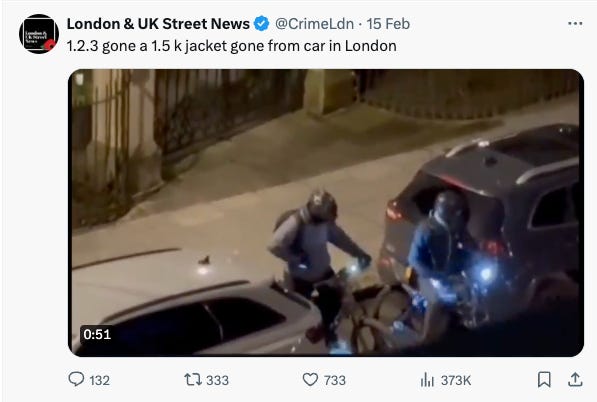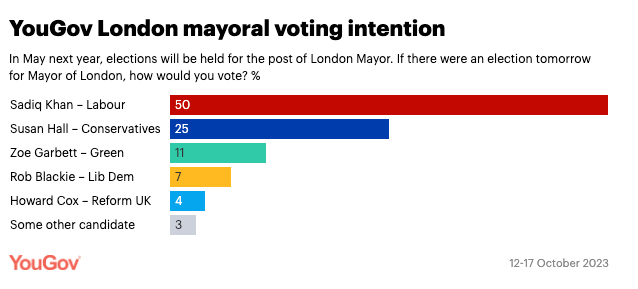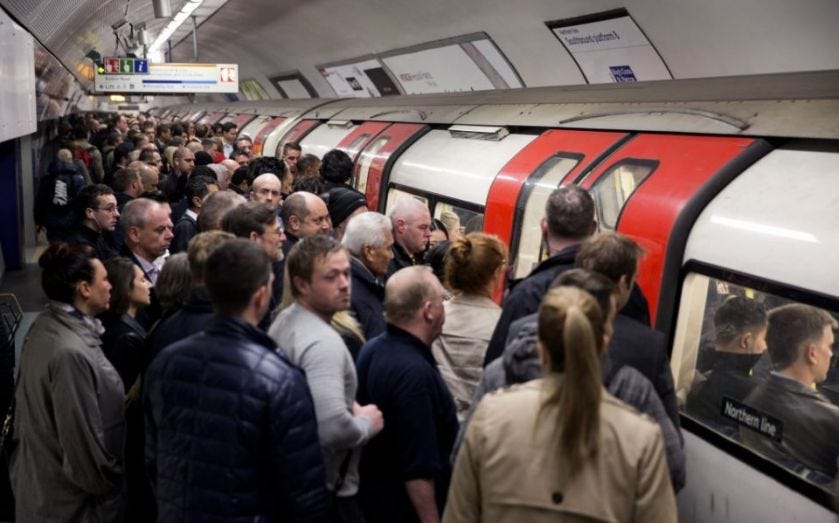Summary:
£6.3 million on a rebrand is vintage Khan-ism.
Crime is worse in the city… as is the public transport system… as is the cost of living.
The problem largely lies with a Mayor who relies on publicity stunts and not good governance to carry his tenure in City Hall, where he remains politically unopposed.
The city deserves a Mayor that will improve transport services, reduce taxes, keep streets safe, and provide young people with more economic and social opportunities. London needs better governance if it wants to get it’s mojo back!
By now you will have heard that London’s overground will be partly rebranded with new names for existing lines. Shock, horror… the left-wing Mayor has chosen worthy virtuous names symbolic of overcoming oppression. We will have the Lioness Line, the Windrush Line and the Weaver Line… it’s a pity they couldn’t find time for the Thatcher Line (there remains tragically little to commemorate our first female PM who was an MP in London), or perhaps even the Clive Woodward Line (they won the World Cup too). I am being facetious, because whatever gets picked will inevitably kick-up a stink with somebody. What is more objective, was the chronic cost of this superficial rebrand - £6.3 million. Yep, £6.3 million on a rebrand… for some train lines.
It’s symptomatic of the wider malaise we’ve had from Sadiq Khan’s tenure as Mayor. Unfortunately London is now firm Labour territory. It’s politically uncompetitive. Which means he is increasingly unaccountable.
And that is a disaster, because the capital city that nearly 9 million of us work and live in is starting to fall apart at the seams. From crime, tax rates, infrastructure, housing, social unrest and general quality of life… many aspects of London are becoming unbearable. And that fact is damning for the Mayor of London, 8 years in to his tenure and looking to be re-elected for a 3rd time.
Let’s start with the most obvious and stark example of Sadiq Khan’s failure in the last several years:
Crime - London’s crime rate has risen in recent years. It fell substantially in the 00’s, settling at 87.1 (per 1000 people) by 2015/16, before rising back up to over 100 before Covid-19 pandemic and 101 in 2022/23. Some crime groups have fared worse than others, most appalling has been the increase in problem gang violence, knife crime and stabbings across the city. The number of ‘knife or sharp instrument offences’ recorded by the police in London increased by more than 50% between 2016 and 2020 (before lockdown). In April 2018 the surge in stabbings across London (predominantly youth on youth crime) took London’s homicide rate above New Yorks, for the first time in history.
Part of the reason was the reduction in the use of Stop and Search tactics by the Met. Although the number of Stops carried out in London was in decline before Sadiq Khan arrived in City Hall (although he has clearly delayed an effort to bring it back). But a broader more passive approach to policing is certainly not helping the matter. Whether that includes less Stop and Search, the virtual decriminalisation of marijuana usage in public, a decline in the number of police officers in the Met and on the street between 2010 and 2019, or the diversion of attention away from the basic crime beat towards accusations of misogyny and criminality among staff members, it is unclear. Either way the reality of gang life, anti-social behaviour, petty and serious violent crime have worsened in London in recent years. I would highly recommend following @CrimeLdn on twitter/X.com as a way of tracking the dire situation on our streets.




TfL - We remember the bitter relationship between Transport for London, the RMT and Boris Johnson had when he was at City Hall. And we remember the ‘Zero Strike Pledge’ Sadiq Khan made when running against Zac Goldsmith in 2016. By 2024, London had endured 140 separate strikes, a significant increase on the 35 Boris Johnson oversaw as Mayor. Yes covid and inflation have placed pressure on incomes and the Unions response was characteristically predictable. But equally, Khan’s management of the situation hasn’t been helped by refusing to impose tougher rules on striking tube drivers, and the preferential treatment of workers covered by the RMT compared to those under ASLEF. It has been a sequence of remarkable cock-ups.
The most recent report on TfL operational performance found the percentage of disruptions has almost doubled from 5% to 10% since 2010. And in 2023 only half of respondents felt ‘TfL cares about its customers’, compared to a customer satisfaction score of 85 in the 2015/16 TfL annual report.
Pair strikes, poor service and disruptions with the fact we also pay a huge amount to commute through London every day. In 2010 a 7-day commuter card for someone travelling between Zones 3 and 1, cost £30. Today it’s nearly £48 which is an above inflation increase. The cost of an annual travel pass across the same zones cost around £1,500 in 2015. Today it’s 27% higher at more than £1,900. London’s public transport system is now one of Europe’s most expensive. Commuters have been on the hook for exorbitant costs at TfL via government bailouts too. In December of last year, the Department for Transport granted TfL another £250 million in grant funding for upgrades, its seventh bailout since 2020 and bringing the total given to TfL to £6 billion. Transport Secretary Mark Harper, an eminently fair bloke who always plays with a straight bat, said “The Government has expressed ongoing concern about the management of TfL by this mayor, and it is disappointing that London taxpayers are having to foot the bill for the GLA’s [Greater London Authority] poor governance and decision-making”.
ULEZ and Clime Change - Of course, it wouldn’t be fair to talk about the dire cost of commuting in London without pointing to the ludicrous travesty of ULEZ in London. When the first ULEZ was introduced in 2019, it covered just the Congestion Charge Zone. By 2021, it was expanded to cover everything in Central London (pretty much Zone 3), and then of course, in 2023, it was expanded to cover everything in Greater London. People living in ‘the burbs’ aren’t as well covered by the Tube and Overground, so the implication of a £12.50 charge on their daily commute was a huge imposition. Not least after a meek £2,000 grant was offered to buy a new car in the 9 months between the expansion being announced and applied! And of course, you had many people impacted who live outside London but commute to areas like Morden, Catford, or Bromley for work. There was and is, massive concern of the impact of ULEZ on employees and employers who will struggle to shoulder the extra cost. And for what? The evidence that ULEZ works is thin at best, and while Londoner’s are on the hook for this new tax, they have had to withstand the militant terrorism of Just Stop Oil and Extinction Rebellion. Ironically, these ‘well-off hippies’ have done a better job bringing people of the capital together, in utter derision and disgust at their antisocial and non-sensical tactics. Apart from our Mayor though, who felt the need to say that Just Stop Oil were an important pressure group with a worthy cause.
Council Tax and the Cost of Living - Returning to the cost of Sadiq Khan on the capital, the Mayor’s office have increased the precept embedded in our Council Tax by 71% since 2016. The average Band D household has to pay £471.40 (up from £276 when Khan arrived in office). This comes on top of the increased cost of commuting (whether by car or by tube) that we’ve already spoken about. And of course the increased cost of renting or buying (for the very lucky ones) across London. The average tenant (according to Which consumer magazine) is now asked to pay £2,500 per month. An index of London rental prices shows a roughly 20% increase since 2016.

https://www.statista.com/statistics/285963/london-monthly-index-of-private-housing-rental-prices-iphrp/ Data for house prices are even more extreme. Between 2009 and 2022, house prices more than doubled in London, a rate 25% faster than the rest of England. Is it fair to lay the blame for the country-wide housing crisis at the door of the Mayor. Of course, not entirely. Massive international demand for London properties is part of the right aspiration to keep London and attractive international destination for investment. Equally, the terrible planning rules that govern what can be built and where, sit with Central Government. But the Mayor still missed his affordable homes target, with money made available to him from the Government (although he would argue he did hit the target after designating new builds from other building projects, to sit under his affordable homes target). A letter from the Housing Association sector last week said only 1,769 affordable homes will be built in the capital this year!

Conclusion
Not much is better about London today compared to 2016. Indeed the 8 years Boris Johnson worked from City Hall, London delivered the 2012 Olympics (objectively one of the finest hosts of the International tournament in recent years); the iconic Barclays Bike Scheme; retained it’s place as Europe’s financial centre (and one of three global financial centre’s) in the aftermath of the 2008/09 financial crisis; helped reimagine the Millennium Dome as the O2 arena, a huge global success in arts and entertainment; reduced knife crime, homicide, and rebuilt London’s moral core after it was ripped apart during the riots of 2011. London feels an entirely different place today than it did at the heady heights of summer 2012. £6.3 million to rebrand parts of the London Overground cannot be seen as an achievement when the Hammersmith bridge remains closed after 4 years, with no end in sight; after massive delays to Crossrail 1 and with Crossrail 2 all but binned; with pollution remaining a huge problem (evidenced by the death of Ella Kissi-Debrah); with knife crime at record highs and after the scandalous management of the Sarah Everard tragedy.
No-one can deny the election of a Muslim man in our capital city with a large Muslim population was a great step-forward for London. And everyone should know the vile racist abuse and threats Sadiq Khan has been subject too (from all sides of society) as a result, that has meant he has full time police protection. But virtue politics will only carry you so far… at the end of the day, the city deserves a Mayor that will improve transport services, reduce taxes, keep streets safe, and provide young people with more economic and social opportunities.









